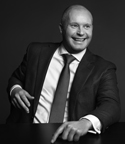The article has originally been published on WealthBriefing. Read the article here.
The trend of high net worth individuals emigrating to certain countries or adopting dual-passports, multiple residency and so forth, is well established. They are courted by governments around the world with "golden visa" programmes, as in the case of the US (which recently changed its investment visa programme), the UK, Singapore, Malta, Spain, Mauritius, various Caribbean jurisdictions, Portugal and former Eastern bloc nations such as Moldova.
Lombard International Assurance has a particular vantage point on these cross-border issues, […] specialising in areas such as private placement life insurance policies and other structures to protect and transfer wealth, often in international situations. To discuss some of these issues is Jurgen Vanhoenacker, executive director of sales and wealth structuring, Lombard International Assurance.
Wealthy individuals are living increasingly globalised lives. A record breaking 108,000 high net worth individuals moved country last year - a 14 per cent increase compared with 2017, according to the Global Migration Review 2019 by AfrAsia Bank and New World Wealth. But enjoying the benefits of an interconnected global economy also comes with challenges.
Potentially the most difficult issue facing the globalised wealthy is how to structure effective cross-border wealth solutions that cater for international lifestyles. For HNW individuals, emigrating does not mean cutting ties with the country they are leaving. It is now relatively commonplace for wealthy families and businesspeople to claim residence in one region, hold significant business assets in another, and send their children to school in a third. This means that wealth and family are cast between multiple countries, causing serious complexities in building, protecting and passing down their life’s legacy.
Take, for example, the 3,000 HNW individuals who emigrated from the UK in 2018. Growing political uncertainty on the outcome of Brexit and the possibility of a Corbyn-led government are amongst some of the key reasons why many wealthy individuals have left, emigrating to countries with greater economic security that were less likely to have unfavourable changes to wealth and inheritance taxes. However, many will still have business interests in the UK. Maybe their children will continue to study there. Regardless of whether they move abroad, ties to the UK will mean that HNW individuals are still affected by changes to the UK economy or political scene.
Moreover, even if wealth and family are relocated, problems can arise with differences in the way in which countries view certain asset classes. For example, at common law there are tax advantages for holding assets in trusts. HNW individuals moving to Spain, Italy or France will be entering a civil law environment. These countries view trusts differently and impose very different tax laws. In some instances, people can even be taxed in both the country where they are emigrating from and the country where they are immigrating to. This can get even more complicated when families feel compelled to relocate their family offices. While the EY Family Office Guide points out that geographic proximity should be one of the key factors in choosing a location for family offices, this can often mean massive logistical and taxation issues which make relocation highly inefficient.
Life insurance gives wealthy individuals a comprehensive means of structuring their wealth, regardless of the unique needs or complexities caused by their globalised lives. Placing assets in a unit-linked life assurance solution provides the opportunity to invest in non-traditional assets, and benefit from deferred tax treatment, portability, asset protection and to appoint beneficiaries of your choice. It also gives family offices the ability to operate effectively across multiple regions, ensuring that they can maximise cost and tax efficiencies.
HNW individuals will continue to seek to benefit from the economic and personal opportunities on offer from an international lifestyle. And with wealth creation increasingly coming from developing markets, the complexity involved in the lives of internationally-mobile HNWIs will only increase. For those seeking to make the most of a globalised economy, they will need a wealth structuring model that can support them. They need an answer to their worries about ensuring that their wealth will last until retirement. They need a model that can help them build their wealth across multiple markets, protect their assets in the most tax efficient way possible, and ensure that they are able to pass down their life’s legacy to their family members regardless of where they live.
 |
| Jurgen Vanhoenacker |
| Executive Director, Sales, Marketing & Wealth Structuring |